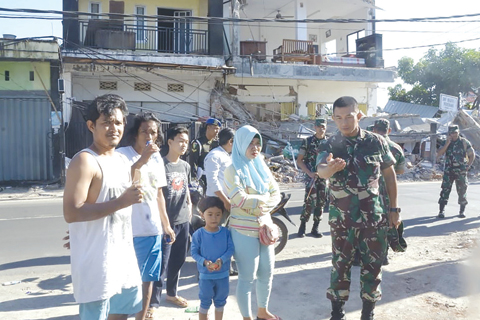Strong earthquake triggers landslides, damaging buildings
 PEMENANG: Indonesian Military shows a soldier talking to residents in Pemenang, northern Lombok, after a 6.9 magnitude earthquake struck. — AFP
PEMENANG: Indonesian Military shows a soldier talking to residents in Pemenang, northern Lombok, after a 6.9 magnitude earthquake struck. — AFPMATARAM: A strong earthquake rocked the Indonesian island of Lombok yesterday, triggering landslides, damaging buildings and sending people fleeing just two weeks after a tremor killed more than 480 people there. The 6.3-magnitude quake, centered in East Lombok, struck at a relatively shallow depth of seven kilometers (four miles) and was felt across the island, officials said.
It was the third major quake in less than a month to rock the island, after deadly tremors on July 29 and August 5 and numerous aftershocks. "The earthquake caused people to panic and flee their houses," national disaster agency spokesman Sutopo Purwo Nugroho told Metro TV. "There have been no reports of death or (serious) damage but people are traumatized." At least one person suffered minor injuries while two more fainted from shock, he added.
Landslides were reported in a national park on Mount Rinjani where hundreds of hikers had been briefly trapped after the quake in late July. The park has been closed since then. Local disaster mitigation agency spokesman Agung Pramuja said several houses and other structures in the district of Sembalun, on the slopes of Mount Rinjani, collapsed yesterday after being damaged by the previous two quakes. The structures included checkpoints once used by trekkers climbing the mountain, Pramuja said, adding that the exact number of damaged buildings was still being checked.
Residents said the latest earthquake was felt strongly in East Lombok. "I was driving to deliver aid to evacuees when suddenly the electricity pole was swaying. I realized it was an earthquake. "People started to scream and cry. They all ran to the street," East Lombok resident Agus Salim told AFP. The tremor was also felt in the island's capital Mataram and on the neighboring resort island of Bali. "Everybody ran outside their house. They're all gathering in an open field, still terrified," said Endri Susanto, a children's rights activist in Mataram. "People are traumatized by the previous earthquakes and aftershocks never seem to stop."
'Ring of Fire'
The latest tremor comes two weeks after a shallow 6.9-magnitude quake on August 5 damaged tens of thousands of homes, mosques and businesses across Lombok. At least 481 people died and thousands were injured. The hardest-hit region was in the north of the island, which has suffered hundreds of aftershocks. A week before that quake, a tremor surged through the island and killed 17. The August 5 quake left more than 350,000 displaced, with many sleeping under tents or tarpaulins near their ruined homes or in evacuation shelters, while makeshift medical facilities were set up to treat the injured.
Badly damaged roads, particularly in the mountainous north of the island, are a headache for relief agencies trying to distribute aid. The economic toll of the quake is estimated to be at least five trillion rupiah ($348 million). Dubbed "The Island of a Thousand Mosques", Muslim-majority Lombok is a less popular destination than its neighbor Bali, the Hindu-majority island that is the backbone of Indonesia's $19.4 billion tourist sector.
But Lombok had been earmarked as one of Indonesian President Joko Widodo's "10 new Balis", with the regional government hoping to develop it into a major destination -- especially in the booming halal tourism sector. Indonesia sits on the so-called Pacific "Ring of Fire", where tectonic plates collide and many of the world's volcanic eruptions and earthquakes occur. In 2004 a tsunami triggered by a magnitude 9.3 undersea earthquake off the coast of Sumatra in western Indonesia killed 220,000 people in countries around the Indian Ocean, including 168,000 in Indonesia.- AFP









